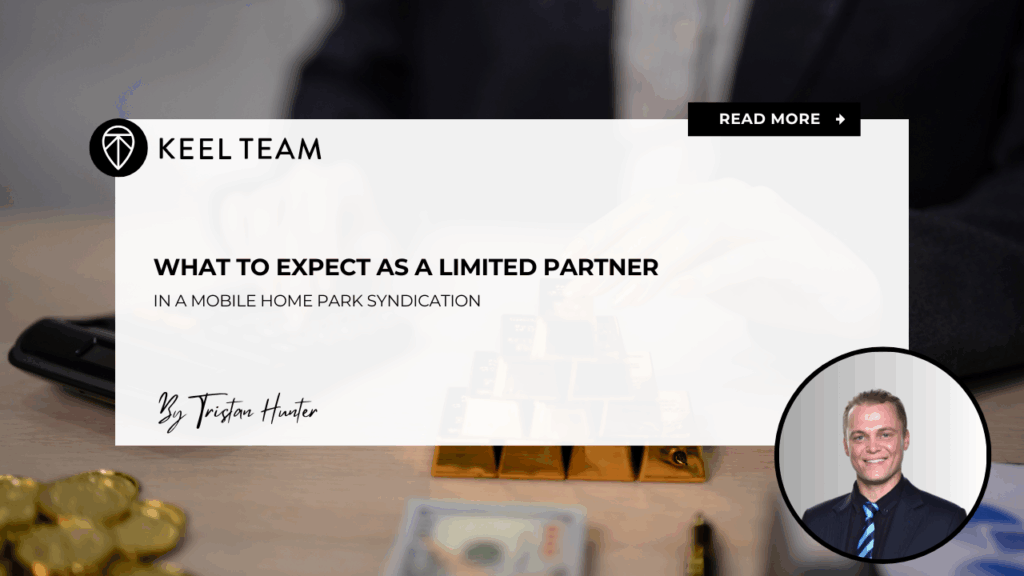What to Expect as a Limited Partner in a Mobile Home Park Syndication
-
 Tristan Hunter - Investor Relations
Tristan Hunter - Investor Relations

Investing as a limited partner in a mobile home park syndication can be an appealing way to gain exposure to the affordable housing sector while benefiting from professional management and potential passive income. However, like any investment, it’s essential to understand the structure, expectations, and possible risks before committing capital.
This article outlines what investors might typically expect when participating as a limited partner in a mobile home park syndication — from deal structure and communication to returns and long-term benefits.
Understanding Mobile Home Park Syndications
A mobile home park syndication is a partnership between an active sponsor (often called the general partner or syndicator) and passive investors (the limited partners). The sponsor identifies and acquires the mobile home park, arranges financing, and manages day-to-day operations. Limited partners contribute capital in exchange for an ownership share and a portion of the profits.
How the Structure Works
In most cases, the sponsor creates a new legal entity — typically an LLC — for each acquisition. Limited partners then invest in that LLC, holding an equity interest proportional to their investment. The sponsor manages the asset and makes decisions on behalf of the group, while limited partners remain passive.
Because this structure allows investors to pool resources, it often makes larger or more stable mobile home park acquisitions accessible to individuals who might not otherwise be able to purchase such assets independently.
The Role of a Limited Partner
Limited partners provide capital but do not take part in active management. This setup offers a way to invest passively while relying on the sponsor’s experience to oversee operations, financing, and exit strategies.
Responsibilities of the Sponsor
The sponsor (or general partner) typically:
- Sources and underwrites mobile home park acquisitions
- Arranges financing and coordinates due diligence
- Manages renovation or infill projects
- Handles resident relations, rent collections, and expense management
- Communicates financial performance and distributes profits to investors
By taking on these responsibilities, the sponsor enables limited partners to benefit from ownership without the operational workload of managing a community themselves.
Download our FREE eBook on the Top 20 things to know BEFORE investing in mobile home parks!
Responsibilities of the Limited Partner
Limited partners are generally responsible for:
- Performing their own due diligence on the sponsor and offering
- Reviewing legal documents such as the Private Placement Memorandum (PPM) and operating agreement
- Understanding risk factors and investment timelines
- Providing required documentation for accreditation or verification of relationship (for 506(b) offerings)
After funding, limited partners usually have limited voting rights but receive updates and financial reporting throughout the investment period.
The Investment Process Step by Step
1. Reviewing the Opportunity
Sponsors typically share a detailed investor packet outlining the mobile home park’s location, lot count, utility setup, rent levels, comparable sales, and projected returns. Limited partners should study these materials carefully, paying close attention to the assumptions used in rent growth, expense ratios, and exit cap rates.
2. Signing Documents
Investors sign the PPM, subscription agreement, and operating agreement. These documents describe the structure, responsibilities, risk disclosures, and distribution waterfall. It’s often wise for limited partners to consult a financial or legal advisor before signing.
3. Funding the Investment
Once documents are executed, investors transfer funds to the entity’s escrow account. The sponsor uses these funds for the down payment, closing costs, and early improvement plans.
After closing, limited partners officially hold equity in the mobile home park.
4. Ongoing Reporting and Distributions
Sponsors typically provide quarterly or semiannual updates with income statements, occupancy data, and progress reports. Distributions, if any, are usually paid quarterly, though timing varies depending on each deal’s performance and structure.
How Returns Are Typically Structured
Although every syndication is unique, most follow a structure designed to align the sponsor’s and investors’ interests.
Preferred Return
Many syndications offer a preferred return, meaning limited partners may receive a certain percentage of profits before the sponsor participates in the upside. This acts as a performance threshold, rewarding investors first.
Profit Split
After the preferred return, profits are often split between limited partners and the sponsor based on predefined percentages — for example, 20/80 or 30/70. These percentages vary based on deal size, risk profile, and operational complexity.
Refinance or Sale Proceeds
When the mobile home park is refinanced or sold, limited partners typically receive their initial capital back first, followed by any remaining profits divided according to the waterfall outlined in the operating agreement.
Again, no outcome is guaranteed; returns depend entirely on market conditions, management execution, and property performance.
Communication and Transparency
Effective communication is one of the most important qualities of a strong syndication partnership. Limited partners should expect regular updates that include both financial metrics and operational context — not just numbers on a spreadsheet.
Typical Reports Include:
- Current occupancy and lot rent collection rates
- CapEx progress updates (road improvements, water line repairs, home infill)
- Operating expenses and revenue comparisons to budget
- Market or interest rate commentary from the sponsor
Many sponsors use investor portals to make these reports easily accessible, allowing limited partners to track performance and download documentation for their records.
Risk Factors to Be Aware Of
While mobile home park investing has a reputation for stability, it is not risk-free. Limited partners should understand several potential variables that could influence returns.
Market and Interest Rate Risks
Rising interest rates or economic slowdowns can affect refinance opportunities or buyer demand during an eventual sale.
Operational Risks
Even well-managed mobile home parks can face unexpected costs — such as water line breaks, septic issues, or resident turnover.
Sponsor Execution
The syndication’s success depends heavily on the sponsor’s competence and integrity. Investors should review the sponsor’s track record, communication habits, and conservative underwriting principles.
Liquidity
Most mobile home park syndications are illiquid investments. Limited partners generally cannot withdraw funds before the project concludes, which could be five to ten years depending on the business plan.

Potential Benefits for Limited Partners
Despite these risks, limited partners often find the structure appealing because it combines passive income potential with real-asset backing.
Access to an Experienced Team
Sponsors bring specialized knowledge of mobile home park operations — including tenant management, utility systems, and value-add improvements — that most individual investors lack.
Potential for Passive Income
Once stabilized, mobile home parks can produce steady cash flow through lot rent payments, often less volatile than apartment or retail income streams.
Tax Advantages
Mobile home park investors may benefit from depreciation deductions, cost segregation studies, and other potential tax strategies. These can sometimes offset a portion of passive income, though results vary by individual circumstances and tax laws.
Diversification
Mobile home park syndications offer exposure to an asset class with different demand drivers than traditional multifamily or office real estate, potentially improving overall portfolio diversification.
Exit Scenarios and Time Horizons
Most mobile home park syndications plan for a hold period between five and ten years. During this time, the sponsor may implement operational improvements such as filling vacant lots, upgrading infrastructure, or increasing rents to market levels.
When the business plan is achieved, the sponsor may refinance or sell the property. At that point, limited partners typically receive their capital back plus any profit share.
However, these outcomes are projections and depend on multiple factors outside any single party’s control — including interest rates, cap rates, and macroeconomic conditions.
Key Considerations Before Investing
Before committing funds, limited partners might consider:
- Track Record: How many mobile home parks has the sponsor successfully acquired and managed?
- Transparency: Are financial updates and decision rationales clearly communicated?
- Alignment: Does the sponsor invest their own capital in the deal?
- Conservatism: Are projections based on realistic rent and expense assumptions?
- Investor Relations: How quickly and clearly does the team respond to questions?
Asking these questions upfront helps set expectations and build confidence in the partnership.
Final Thoughts
Becoming a limited partner in a mobile home park syndication can be a meaningful way to participate in the affordable housing space without managing a community directly. Investors can gain potential exposure to consistent cash flow, professional oversight, and long-term equity appreciation — while remaining passive.
That said, results can vary, and investors should always conduct their own due diligence before investing. Understanding how syndications work, what risks exist, and what communication to expect can make the experience more transparent and rewarding in the long run.
Are you looking for MORE information? Book a 1-on-1 consultation with Andrew Keel to discuss:
- A mobile home park deal review
- Due diligence questions
- How to raise capital from investors
- Mistakes to avoid, and more!
Disclaimer:
The information provided is for informational purposes only and is not investment advice or a guarantee of any kind. We do not guarantee profitability. Make investment decisions based on your research and consult registered financial and legal professionals. We are not registered financial or legal professionals and do not provide personalized investment recommendations.

Tristan Hunter - Investor Relations
View The Previous or Next Post
Subscribe Below 👇





